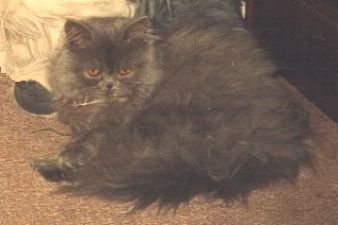


Introduction
Hello and welcome, though I am sorry you need to be here.
My name is Helen, and I have had three cats with CKD, Tanya, Thomas and Ollie (their photos are above). I created this website in 2000 because I know first hand the shock of the diagnosis, and I want to give people the detailed, practical information that would have helped me the first time I received the CKD diagnosis. I still remember how my heart sank and my mind went blank with fear of the unknown that lay ahead of me.
I don’t sell any products, and I don’t run adverts or accept offers from others to promote their products (though I am often asked to do so). I am not after your money, I don’t sell false promises, and I’m afraid I don’t have a miracle cure (I wish I did). I just try to tell you about the best, proven ways to treat CKD in cats, and to hold your hand as you get to grips with your cat’s situation.
What is Kidney Disease?
There are two main kinds of kidney disease:
- Chronic Kidney Disease, abbreviated as CKD; and
- Acute Kidney Injury, abbreviated as AKI.
AKI is a serious condition that usually comes on suddenly and is often triggered by a particular event or “insult”, such as your cat eating something poisonous. Lilies and antifreeze are both extremely toxic to cats and may cause AKI. Cats with AKI are normally hospitalized for treatment, which usually includes intravenous fluids (IV fluids, also known as a drip); depending on the cause of the AKI, other treatments may also be offered. AKI is hard to treat, but if the cat survives the initial crisis, he/she can often regain much or sometimes all of his or her normal kidney function.
CKD may also manifest itself very suddenly and require hospitalisation, but in contrast to AKI it is an ongoing disease in which it is not possible to regain lost kidney function. Therefore the goal is to keep the remaining function for as long as possible.
This site is primarily designed for people with a cat with the chronic form of the disease (CKD), but may be of some use to those with a cat with AKI. Please visit the Acute Kidney Injury page for more information.
I sometimes hear from people whose cats have lower urinary tract problems rather than kidney problems (the kidneys are part of the upper urinary tract). Lower urinary tract problems are relatively common in cats, but do not automatically lead to kidney problems. So please be sure your cat has kidney issues before using this website, because treating for the wrong condition is at best pointless and at worst dangerous.
Aims of the Site
This site shares all the information and tips I know, in great detail, in order to help your cat feel better and hopefully extend his/her life. I am not a vet myself, just an ordinary person who has educated herself about CKD in cats.
If you are a vet visiting this site because your client has mentioned it to you, I can imagine your heart is sinking about now. It may reassure you to know that I have a post-graduate diploma in companion animal behaviour so I am used to reading scientific articles, and I do try to cite veterinary sources to support what I say. Many vets do recommend the site, including a number of vet schools and feline veterinary specialists (see Recommendations and Awards).
If Your Vet Has Recommended Immediate Euthanasia
It is possible that this is the right course of action. However, some vets are not overly familiar with the latest treatments for CKD, and may recommend euthanasia prematurely. You need to educate yourself and work out how severe your cat’s case is before you make this irrevocable decision.
If your cat has been on intravenous fluids (a drip) at the vet’s for 24 hours and the vet says your cat has not improved and it is time to say goodbye, chances are this is premature. Many cats need longer periods to stabilise.
If your vet says your cat has lost 70% of kidney function, this alone is not grounds for euthanasia. It is actually normal for CKD not to be diagnosed until this much function has been lost. What matters is how well your cat can manage with the function that is left, and a lot of cats do well.
Please read the Just Diagnosed? What You Need to Know First page urgently.
Isn’t Chronic Kidney Disease Terminal?
Sadly, yes, CKD is terminal. BUT that does not necessarily mean death is imminent: it is often possible to buy the cat months or even years of quality life. In fact, with appropriate treatment, quite a few CKD cats not only live for a long time, they eventually die of other causes, with the CKD firmly under control at the time of death.
An analogy used by my vet is that a CKD cat is approaching the edge of a precipice: the cat may approach the precipice very slowly, taking years to reach it; the cat may approach quite quickly; whichever way the cat approaches the precipice, it may be possible to grab the cat and pull him/her back even after he/ she has started to fall over the edge, and this could be done several times if you move quickly enough.
There are almost certainly a few things you can do to help your cat. This site is geared towards slowing the progression towards the precipice, and may also be able to help pull your cat back if he/she has started to fall over the edge; while simultaneously trying to make the cat’s remaining time more comfortable. CKD cats can look very ill at diagnosis, but improve dramatically with treatment, so I strongly recommend trying treatments for at least two weeks if possible before considering euthanasia.
The site provides information on an international basis, aiming to help you wherever you happen to live, although in practice much of the information relates to the USA and Europe since these are the areas where the most treatments are available.
Where to Start
This website is the most comprehensive website about feline CKD in the world, which is both a blessing and a curse. On the one hand it will answer 99% of your questions about kidney disease in cats, but on the other hand it may seem a bit overwhelming to start with. Try not to worry, it will eventually start to make sense.
One really important area to focus on is food intake. It is quite likely that your cat is not eating much or at all. There are several reasons why CKD cats lose their appetites, but probably the most common reason is uraemia, a build up of toxins which make the cat feel poorly. This is treatable, but in the meantime, you have to get food into your cat. It doesn’t have to be a therapeutic kidney diet, but your cat absolutely must eat in order to avoid developing damage to the liver. Please read Persuading Your Cat to Eat for tips on what might persuade your cat to eat right now, and Appetite Loss, Nausea and Vomiting to learn about the treatments that may help in the longer term.
CKD can cause some odd symptoms. For example, if a CKD cat suddenly starts eating litter, this can be a sign of anaemia. Blindness can be a sign of hypertension. Please look at the Index of Symptoms and Treatments if something is worrying you, to see the possible causes of a particular symptom and ways to treat it.
I am currently upgrading the website so some internal links will not work. This is a massive task so please be patient. The Site Guide provides a brief summary of the contents of each page, so if you’re not sure where to find something, look here. You can also use the table of contents in the sidebar or the search facility (on the right, or at the bottom of the page on a tablet or phone).
Tanya’s CKD Support Group
If you need some help, I offer an online support group that enables you to talk to others fighting this disease who can offer help and support as you make your CKD journey. You can read more about the group and how it works here.
Join now, it’s quick, easy and free. Just click here.
Once you apply to join, you will receive an e-mail asking for your name, country of residence, cat’s name and age and reason for joining the group. This information is not sent to the group, just to the small group of moderators who help me run the group. You have to respond to this e-mail before your membership will be approved.
Any problems, please contact the group moderators
My Three CKD Cats
This website is named in honour of Tanya, who was my first CKD cat. Unfortunately Tanya did not receive as much proactive care as Thomas and Ollie, because at the time that she was diagnosed, I did not know about the treatment options described on this website (and of course many of them were not available back then). I tried desperately to find information to help her but I was not online, so my options were limited. Once I got online, I vowed that nobody else should have to go through that, so I created this website.
Thomas, in contrast, had much more severe CKD yet survived longer than Tanya because he received more proactive treatment.
Ollie was a somewhat different case: he came to me a week before his sixteenth birthday with relatively mild CKD but with a host of other health problems which ultimately took him from me.
You can read more about all of them here. You can also read some Success Stories here, some of whom survived for years with CKD. I can’t promise the same success for your cat, but in most cases it’s certainly worth a try.
Good luck on your CKD journey.
Helen

Share This Site: A Notice for Your Vet’s Bulletin Board or Your Local Pet Shop
